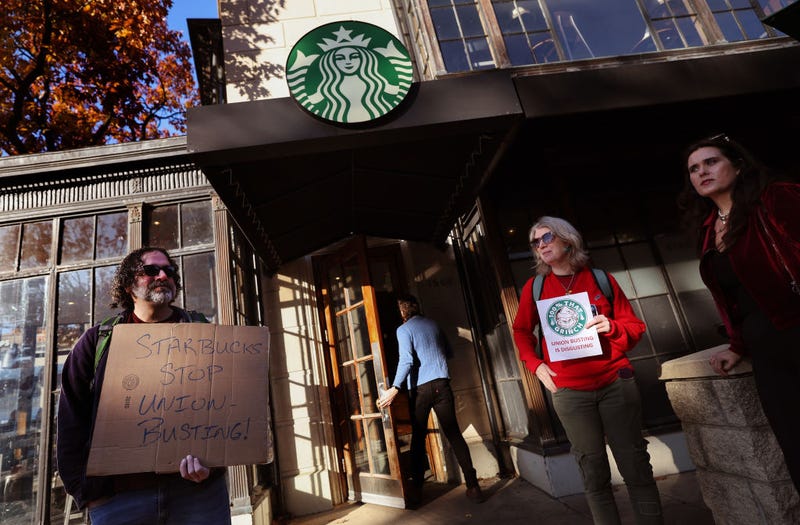
Getting a cup of coffee can be an important way to kickstart your day. However, if you are a fan of Starbucks you might have seen calls to boycott your morning ritual. What’s going on?
People are actually calling to boycott the popular coffee chain for several reasons, and the main ones are related to unions and the Israel Hamas war.
Let’s start with unions. Audacy has previously reported on Starbucks employees’ efforts to unionize. Under its previous CEO, Howard Schultz, Starbucks came out against labor movements, per an Axios report. Now, Starbucks is under different leadership with CEO Laxmann Narasimhan, who is more supportive of unions.
“On behalf of our company, [chief partner officer, Sara Kelly] affirmed a shared goal with the union to progress negotiations. We have asked Workers United – on behalf of our represented partners – to work with us to break the gridlock and agree to a collective bargaining process with the hopeful goal of reaching agreements in 2024,” he said in a Dec. 11 statement.
Still, Axios reported that the National Labor Relations Board called on Starbucks on Wednesday to immediately reopen 23 stores workers allege were shut in response to union organizing activities. For example, six locations in Southern California that closed last summer may have to reopen.
Last month, the union promoted the “Red Cup Day” strike on one of the chain’s biggest sales days. Their announcement said that Red Cup day is infamously hard and understaffed.
Starbucks’ union is also involved in boycotts of the brand surrounding the Israel Hamas war.
“On October 18, Starbucks filed a complaint in the United States District Court for the Southern District of Iowa in Davenport, Iowa,” said a statement from the company. According to the Intercept, the complaint was related to the union’s X post that read “Solidarity with Palestine.”
According to Starbucks “as the violence against the innocent in the region continues, some people are mistakenly tying these remarks to us, because Workers United and its affiliates and members continue to use our name, logo and intellectual property.”
This month, Starbucks continued to release messages seemingly in support of unions.
“Sara Kelly, chief partner officer, sent a letter to Workers United President Lynne Fox in an earnest attempt to propose a path forward that would allow us to resume productive contract negotiations for our U.S. partners who have chosen to elect union representation,” said a Dec. 8 statement.
This week, the company announced an independent, third-party report to evaluate the Company’s adherence to its commitment to the principles of freedom of association and the right to collective bargaining had completed. It found that there are some actions Starbucks could take to improve its stated commitments.
As these tensions continue, Vox reported this week that Starbucks’ share price has declined by 9% since mid-November “meaning a decline of some $11 billion in its market cap.”
While the boycotts have made headlines and are trending on social media, experts aren’t sure they’re behind the financial slump.
“I don’t think it’s the protests that are driving this,” said Sara Senatore, senior research analyst at Bank of America, according to Vox. She said the timing of foot traffic declines doesn’t coincide with the timing of the boycotts. “This is not the first time that we’ve seen this kind of activity, and so it’s hard, in my view, to conclude that’s the reason that traffic has been so slow.”
